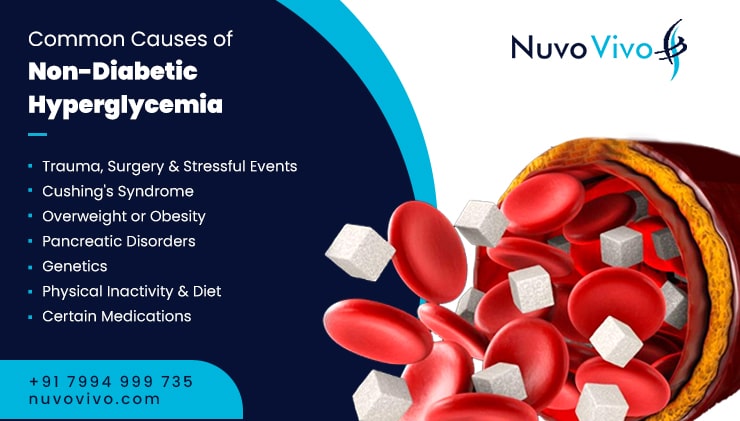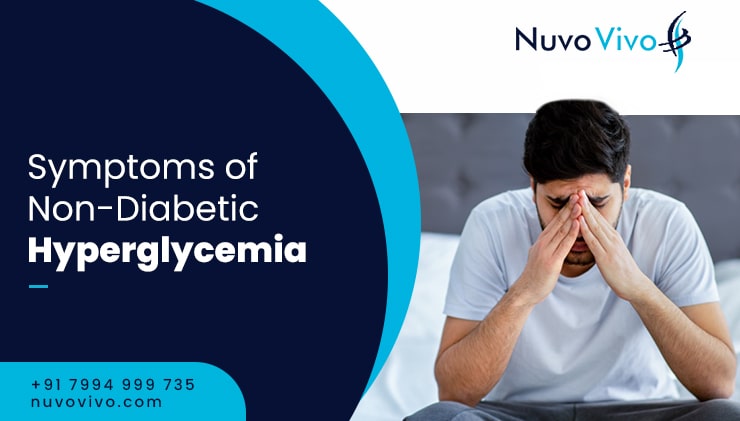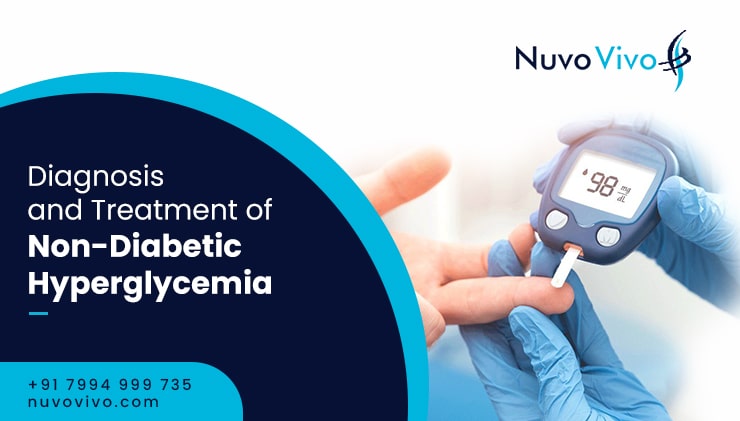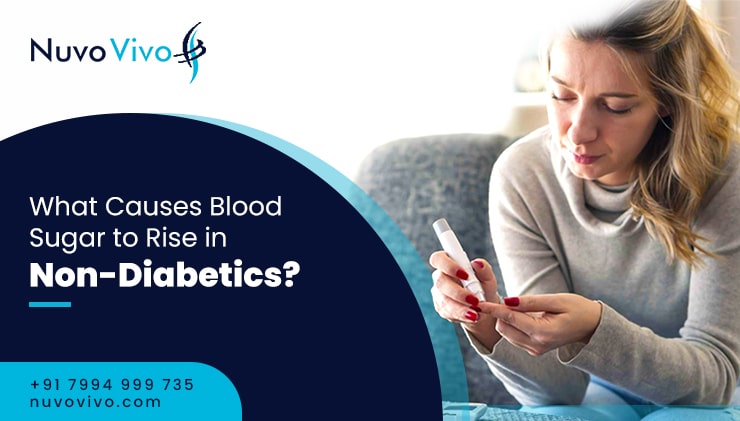Have you ever experienced a spike in blood glucose levels than normal, but not in the diabetic range? Are you wondering how a nondiabetic can have high blood sugar?
Many people suffering from high blood sugar without diabetes are often perplexed with their condition. They may even puzzle about whether hyperglycemia without diabetes is real or not.
Don’t let the nondiabetic high blood sugar trick you. It’s real. Indeed, it is a common condition called nondiabetic hyperglycemia.
Most people with nondiabetic hyperglycemia tend to ignore their condition, and they would like to believe that it’s not a big deal. But the surprising truth is that nondiabetic hyperglycemia is a severe problem and can even be fatal.
Even though the higher-than-normal blood sugar level is not high enough to qualify for diabetes, it can put you at an increased risk of developing type 2 diabetes, heart disease, stroke, and other complications.
Want to know more about this serious condition? Right now, maybe you are a little confused about this condition and probably have a lot of questions coming into your mind. Drop your worries and scroll down to keep on reading.
In this article, you will find the answers to a lot of questions like what causes blood sugar to rise in nondiabetics, can a nondiabetic have high blood sugar, what are the risk factors for high blood sugar without diabetes, what are the symptoms of high blood sugar in nondiabetics, How is nondiabetic high blood sugar diagnosed and treated, etc.
ALSO READ: Understanding your Blood Pressure
What is Nondiabetic Hyperglycemia?
Hyperglycemia is a condition that affects people with diabetes in which the blood glucose levels are too high than average. But, sometimes, people who don’t have type 1 or type 2 diabetes may also suffer from raised blood sugar levels, which is referred to as nondiabetic hyperglycemia.
Nondiabetic hyperglycemia causes high fasting blood sugar (more than 125 mg/dL) and blood glucose levels greater than 180 mg/dL in one or two hours after a meal.
This condition usually happens when the person has encountered any kind of trauma, major illness, or stressful event. The excess pituitary hormone secretions and the stimulation of the sympathetic nervous system may contribute to significant hyperglycemia.
Normally, the nondiabetic high blood sugar gets settled on its own once the underlying cause of stress or trauma improves; however, this may not always be the case.
This condition is left untreated in a lot of people as the symptoms of high blood sugar in nondiabetics are hard to feel and often go undetected.
Untreated nondiabetic hyperglycemia can lead to serious health problems, delay healing, and can cause damage to blood vessels, nerves, and organs. The increased risk of infections and cardiovascular diseases is another major threat associated with this condition.
ALSO READ: Stevia – A Sugar Substitute
What Increases the Risk for Nondiabetic Hyperglycemia? Common Causes

Are you curious about what causes blood sugar to rise in nondiabetics, or what are the risk factors of nondiabetic high blood sugar? Several factors can contribute to nondiabetic hyperglycemia, including:
- PCOS (Polycystic Ovarian Syndrome)
Women with PCOS are at great risk of developing nondiabetic hyperglycemia. The hormonal imbalances can cause insulin resistance, a condition in which the cells don’t respond well to the hormone insulin, resulting in a rise in insulin levels which in turn leads to hyperglycemia even in nondiabetic people.
- Trauma, Surgery & Stressful Events
The physical stress due to surgery or any type of traumatic injury can be a significant risk factor of nondiabetic hyperglycemia.
The post-traumatic metabolic changes can cause increased gluconeogenesis, insulin resistance, decreased glycogen synthesis and can also trigger increased levels of plasma catecholamines and glucocorticoids, eventually leading to hyperglycemia, which is also referred to as stress-induced hyperglycemia.
- Cushing’s Syndrome (Hypercortisolism)
Cushing’s syndrome is an endocrine disorder that happens when the body has too much of a hormone called cortisol.
The long-term effect of abnormally high cortisol in the body can be a major contributor to hyperglycemia without diabetes because elevated cortisol can lead to insulin resistance.
- Overweight or Obesity
Being overweight and obese has always been a risk factor for developing a lot of health problems, one of which is nondiabetic hyperglycemia.
The elevated fatty acids and inflammation caused by obesity can cause impaired insulin sensitivity, which can lead to hyperglycemia without diabetes. Unhealthy food habits, overeating, and lack of physical activity can be some of the reasons for gaining weight.
Lifestyle changes, regular exercises & proper diet can help maintain a healthy BMI (Body Mass Index), thereby reducing the chances of high blood sugar.
- Pancreatic Disorders
The damage and inflammation to the endocrine pancreas caused by pancreatic illnesses like pancreatic cancer, pancreatitis, etc., along with the metabolic stress associated with those diseases, can be one of the causes of hyperglycemia in nondiabetics.
Insulin hormone is synthesized and secreted by the beta cells (β-cells) of the pancreas. The impairment of beta cells in the pancreas due to any disease affects its ability to produce enough insulin.
Due to insufficient production of insulin, the body can’t effectively manage blood glucose levels, leading to nondiabetic hyperglycemia.
- Genetics
Hyperglycemia can be hereditary. Genetic factors can make some people vulnerable to high blood sugar. Insulin resistance tends to run in families.
People with a family history of diabetes or gestational diabetes are more likely to increase the risk of developing blood sugar spikes in nondiabetics.
- Physical Inactivity & Diet
Not being physically active along with unhealthy eating habits can contribute to high blood sugar without diabetes.
Excess intake of foods high in sugar and carbohydrates can cause blood glucose levels to rise soon after eating. Too much alcohol consumption may impair the activity of the pancreas that can cause increased insulin resistance, leading to nondiabetic high blood sugar.
- Certain Medications
Some medicines may enhance glycogenolysis or gluconeogenesis, which in turn leads to hyperglycemia without diabetes.
People who take medications like corticosteroids (e.g., hydrocortisone and prednisone), birth control pills, beta-blockers, thiazide diuretics, drugs like quetiapine and clozapine that treat mental health problems, statins, catecholamine vasopressors like dopamine and norepinephrine, etc., are at an increased risk of developing high blood glucose levels without diabetes.
ALSO READ: HDL vs LDL Cholesterol Differences
Symptoms of Non-Diabetic Hyperglycemia

In most cases, nondiabetic high blood sugar doesn’t show any signs and symptoms until the blood sugar levels are significantly elevated. However, watch for the following symptoms of nondiabetic hyperglycemia:
- Excessive thirst
- Intense hunger
- Frequent urination
- Fatigue or tired feeling
- Blurred vision
- Abdominal pain
- Headache
- Nausea and vomiting
- Trouble concentrating
- Blood glucose level more than 180mg/dL
How is Nondiabetic Hyperglycemia Diagnosed and Treated

Even though you do not have diabetes, it is crucial to diagnose and treat the blood sugar spikes because untreated nondiabetic hyperglycemia can become severe and lead to life-threatening emergencies like diabetes coma.
If you recognize any symptoms of nondiabetic hyperglycemia, consult your healthcare provider and get your blood sugar tested. The nondiabetic high blood sugar can be diagnosed with a blood test such as a fasting plasma glucose (FPG) test, glycated hemoglobin (A1C test), or a fructosamine test.
The higher-than-normal blood glucose levels after a meal, as well as high fasting blood sugar in nondiabetics, need to be treated.
Even though it is not severe, nondiabetic hyperglycemia in the long term can cause harm to blood vessels, nerves, and organs. Depending on the cause and severity, your doctor may prescribe insulin or other medication to lower the blood glucose level.
Also, incorporating a healthy diet and lifestyle changes can help control nondiabetic hyperglycemia.
How to Prevent Nondiabetic Hyperglycemia?
“Prevention is better than cure.” Be physically active, plan your meals properly, eat a healthy balanced diet, maintain a healthy body weight, stop smoking and cease or limit alcohol intake to prevent high blood sugar without diabetes.
Regular exercise is the best way to keep nondiabetic hyperglycemia at bay. Working out will help increase insulin sensitivity and decrease blood glucose concentrations. However, do consult your healthcare provider and get guidance before you start an exercise program.
Drinking plenty of water helps in flushing out excess glucose out of the body and may protect against a spike in blood sugar levels. Try to include low-glycemic index food, protein-rich food, and soluble fibers in your diet plan.
Also, try to limit your carb intake. Try to practice mindful eating to ensure that your food habits don’t trigger spikes in your blood glucose levels. Work closely with your healthcare provider and a dietitian and create an individualized meal plan to prevent nondiabetic high blood sugar.
ALSO READ: Diabetes Food Chart
Summary
Can a nondiabetic have high fasting blood sugar? Yes. High blood sugar levels while fasting or after having food are normally linked with diabetic patients, but this can also happen to people without diabetes.
Now that you are already aware of what causes blood sugar to rise in nondiabetics and the common risk factors and symptoms, get your blood glucose level checked on a regular basis if you think you are linked with any of the risk factors or symptoms.
If you are diagnosed with nondiabetic hyperglycemia, seek medical help immediately and get treated because untreated nondiabetic hyperglycemia can lead to potentially dangerous health problems.
NuvoVivo is an online health, wellness & fitness center that is into medical fitness & lifestyle management. We specialize in transformation (weight loss, muscle gain) and also in managing lifestyle conditions such as diabetes management, cholesterol, thyroid, PCOD and PCOS management, fatty liver, uric acid, hypertension, etc through nutrition & exercises. Our programs are all online, and our clients are from across the world to manage such lifestyle disorders, lose weight, etc. For more details, Contact us at +91 79949 99914

